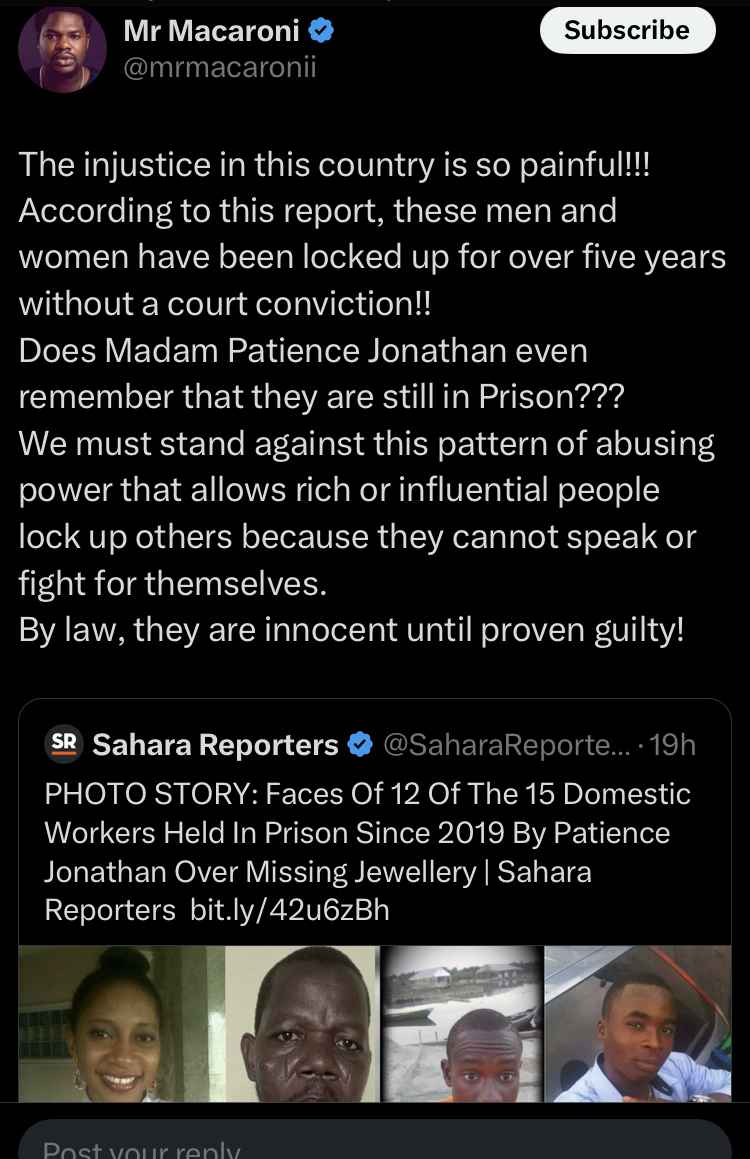Nigerian comedian, actor, and social justice advocate Adebowale Adedayo, widely known as Mr. Macaroni, has ignited public discourse over allegations that former First Lady Patience Jonathan has kept 15 domestic workers detained since 2019 over missing jewelry. The popular content creator’s passionate call for justice has thrust this troubling case back into the national spotlight, raising serious questions about power dynamics, judicial fairness, and human rights in Nigeria.
Taking to social media, Mr. Macaroni expressed profound concern over reports suggesting the domestic workers have been incarcerated for approximately five years without formal court convictions. His public statement highlighted the disturbing nature of such prolonged detention without due process, a fundamental right enshrined in Nigeria’s constitution.
“The injustice in this country is so painful!!!” Mr. Macaroni wrote, his message resonating with thousands of followers. According to this report, these men and women have been locked up for over five years without a court conviction!!
The allegations center around jewelry reportedly belonging to Mrs. Jonathan that went missing in 2019. Rather than following standard legal procedures, the former First Lady allegedly used her considerable influence to have the domestic workers detained indefinitely, effectively circumventing proper judicial channels.
Mr. Macaroni’s intervention reflects his evolution from merely being an entertainment figure to becoming a prominent voice for social justice in Nigeria. Rising to fame through his distinctive comedy skits often portraying a flamboyant character, Adedayo has increasingly leveraged his platform to speak out against perceived injustices, particularly those involving power imbalances between Nigeria’s elite and ordinary citizens.
Does Madam Patience Jonathan even remember that they are still in Prison???” he questioned, highlighting the callous disregard that often characterizes such situations where the powerful can seemingly forget about those whose lives they’ve upended. This rhetorical question strikes at the heart of how detention without trial can reduce individuals to forgotten statistics in Nigeria’s overcrowded prison system.
The content creator further emphasized that this case represents a broader pattern of abuse of power in Nigerian society, where influence and connections frequently override legal protections meant to safeguard all citizens regardless of their social standing. We must stand against this pattern of abusing power that allows rich or influential people lock up others because they cannot speak or fight for themselves,” he insisted. “By law, they are innocent until proven guilty!”
Patience Jonathan, wife of former Nigerian President Goodluck Jonathan who held office from 2010 to 2015, has maintained a controversial public profile both during and after her tenure as First Lady. Critics have previously questioned her accumulation of wealth and her occasional combative public statements. While she has maintained a relatively lower profile in recent years, these allegations threaten to reignite public scrutiny of her conduct.
Human rights advocates have long criticized Nigeria’s criminal justice system for its significant backlog of cases, overcrowded detention facilities, and the common practice of prolonged pre-trial detention. Reports from various human rights organizations suggest that thousands of Nigerians languish in prisons awaiting trial, sometimes for periods exceeding the maximum sentences they would receive if convicted of their alleged crimes.
The Constitution of the Federal Republic of Nigeria guarantees the right to personal liberty and specifies that individuals arrested or detained should be brought before a court within a reasonable time. The alleged five-year detention without conviction of these domestic workers represents a clear violation of these constitutional provisions if the reports are accurate.
Legal experts weighing in on the controversy have noted that even in cases involving theft, Nigerian law prescribes specific procedures including formal charges, bail considerations, and timely trials. The apparent circumvention of these procedures highlights how influential figures can sometimes operate outside the bounds of standard legal frameworks.
Mr. Macaroni’s willingness to challenge such a high-profile figure reflects a growing trend among Nigerian entertainers who increasingly use their platforms to advocate for social change. In recent years, celebrities like Falz, DJ Switch, and Davido have similarly spoken out against perceived injustices, suggesting a shift in how entertainment figures view their responsibilities to society.
The social media response to Mr. Macaroni’s post has been overwhelming, with many Nigerians expressing outrage over the allegations and calling for immediate intervention by relevant authorities. Human rights organizations have begun advocating for investigation into the status of the detained workers and demanding their immediate release if they have indeed been held without formal charges or proper legal proceedings.
This case also raises important questions about the treatment of domestic workers in Nigeria, who often operate without formal employment contracts or adequate legal protections. Human rights activists have long advocated for better regulations to protect this vulnerable segment of the workforce, who frequently face exploitation, unpaid wages, and occasionally, as this case suggests, extreme injustices.
The Nigerian Correctional Service, formerly known as the Nigerian Prison Service, has yet to issue an official statement regarding the status of these workers or confirm the circumstances of their detention. Similarly, representatives for Mrs. Jonathan have not publicly addressed these specific allegations at the time of reporting.
As public pressure mounts, legal experts suggest that this case could potentially lead to broader conversations about reforming Nigeria’s criminal justice system, particularly regarding pre-trial detention practices and the influence of powerful individuals on law enforcement decisions.
For now, Mr. Macaroni’s intervention has ensured that these allegedly forgotten domestic workers are no longer invisible. His advocacy underscores the crucial role that public figures can play in highlighting injustices that might otherwise remain hidden from public view. Whether this renewed attention will translate into justice for the detained workers remains to be seen, but it has certainly sparked an important national conversation about power, privilege, and the uneven application of law in Nigerian society.




